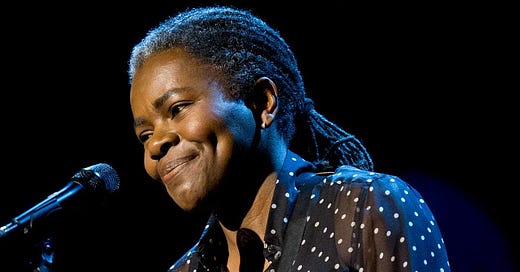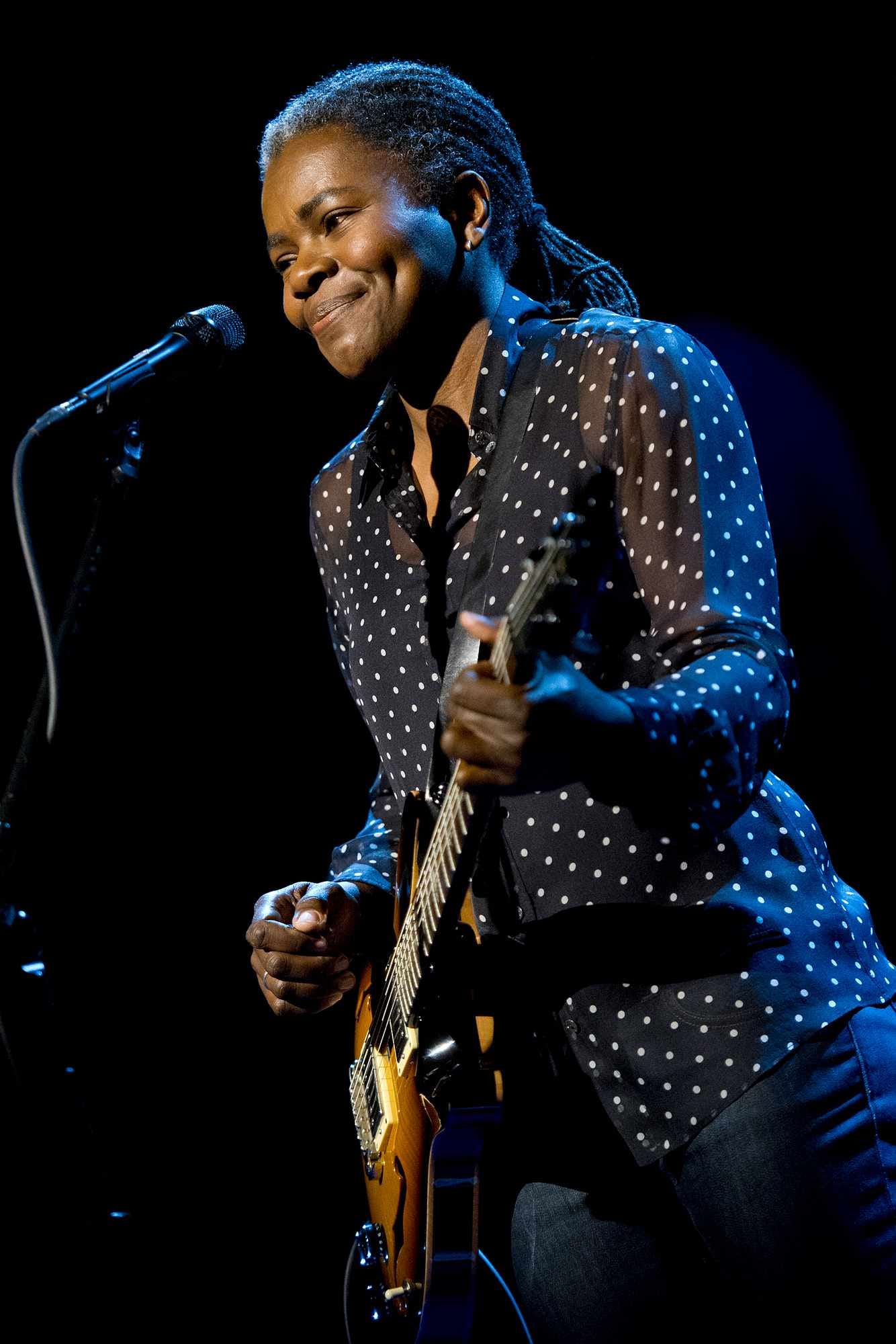How 2 Artists Healed America in 5 Minutes
For the first time in years, the Grammy Awards were relevant...for roughly 5 minutes. But that was all that was needed to temporarily ease the pain of an ailing nation.
I’m ashamed to confess that I’d never heard singer-songwriter Tracy Chapman’s Fast Car in its entirety until just today.
I was not ready.
The song’s simplistic and repetitive structure belies its immense emotional power; it’s a softly disarming work of art, whose poignancy is especially potent for any who’ve endured life at the bottom and yearned for escape. It’s a tragedy told in 5-minutes, a life-cycle of bright hopes and broken dreams, with a hint of danger underneath.
The work is an example of a piece of art that connects with something larger than itself, a piece that feels both personal and universal, and which will live on long after everyone reading this has passed onto the next realm.
One person who was clearly moved by Chapman’s brilliance is country music megastar Luke Combs.
Born and raised in North Carolina, Combs’ resume includes three Grammy Award nominations, four Academy of Country Music Awards, and six Country Music Association Awards (which includes being crowned “Entertainer of the Year” in 2021 and 2022)… not to mention a whopping 16 consecutive #1 hit songs.
Combs’ 2023 album Gettin’ Old featured a cover of Chapman’s masterpiece that went viral, eventually reaching the top spot on the Billboard Country Airplay chart, and peaking at number 2 on the all-genre Hot 100.
The performance netted an estimated 6-figure royalty check for Chapman, and in an era obsessed with firsts earned her the (somewhat tortured) distinction of becoming the first black woman to score a number one country song as sole writer, per The Rolling Stone.
In response, the typically taciturn Chapman graciously stated: “I never expected to find myself on the country charts, but I’m honored to be there. I’m happy for Luke and his success and grateful that new fans have found and embraced ‘Fast Car.’”
Sadly, in the roaring 2020’s neither Chapman’s renewed cultural relevance and success nor her statement matters anywhere as much as the hurt feelings of narcissists bent on hijacking the limelight to air their own grievances.
WHY WE CAN’T HAVE NICE THINGS
It’s uncertain if Washington Post entertainment journalist Emily Yahr knew she’d get ratio’d into oblivion, but her 11:52am tweet on July 13, 2023, set the social media site ablaze.
Choosing violence for lunch, Yahr linked to a lengthy article accompanied by the following:
As Luke Combs's hit cover of Tracy Chapman's "Fast Car" dominates the country charts, it’s bringing up some complicated emotions in fans & singers who know that Chapman, as a queer Black woman, would have an almost zero chance at that achievement herself:
Tracy Chapman—possessed of a wisdom that is rare among popular artists—is notoriously private. She has never divulged her sexuality.
One might presume her legions of fans never cared very much.
Additionally one might think the sextuple platinum status of her self-titled debut album, or her quintuple-platinum fourth album, or her career-total seven Grammy nominations and four wins—including a nod for Best Contemporary Folk Album—might count for something, but apparently not.
One might also notice that Ms. Chapman doesn’t appear to have had any designs on being a country singer in the first place. Speaking as someone who has been black for over four decades—it must be said that very, very, very few black Americans aspire to be country singers at all.
But in the age of professional grievance-mongering the accolades of successful minorities and women of the past are highly inconvenient to less successful artists of the present, and so they must be ignored. Doing so makes artists like Chapman far more easily employed as tools to repair something never considered broken.
But after a decade of unceasing racial unrest, political turbulence, and Covidian hysteria—America herself feels very broken at the moment.
And that is why Chapman and Combs’ performance of Fast Car at the 2024 Grammy Awards, beautifully cathartic, may be one of the most significant cultural moments of the decade.
NATIONAL CATHARSIS
The lights bathed Chapman in an amber glow as she strummed the opening chords on her acoustic guitar. The electricity was immediate, the ovation from the star-studded audience nearly drowning out the first few lyrics.
Chapman—whose perfectly-coiffed silver locks are the only evidence she’s aged at all—exuded a soft radiance, an inviting warmth that drew us in like a close embrace. Her power, as always, lies in her transparency and simplicity, unadorned by melisma or vocal pyrotechnics.
Combs is the stronger vocalist. But his reverence and respect for Chapman, his kid-on-Christmas-morning glee, shining through as he shared the stage with the woman who’d made such an impact on him in his youth, made clear that there was no competition—and if there was, his worshipful bows at the song’s close made clear who he considered the queen, and who the subject.
For five minutes, they created magic that eclipsed the entire event. For five minutes, time stopped, and a nation currently eating itself alive watched a (possibly gay) black female and a straight white male unite—and all that mattered was the power of music to transcend all boundaries.
The performance quickly went viral, instantly flushing the rest of the awards show down the memory hole. It was a catharsis that America sorely needed, a moment which further shamed the Emily Yahrs of the world, shamed all activists masquerading as artists, who prioritize divisive politics and inferiority complexes over bringing beauty into an ailing world.
America is sick of divisive culture wars.
Just a few precious minutes of magic achieved more unity than any influencer, pundit, podcaster, politician, or Diversity consultant could ever hope to achieve.
Such is the true power of art.








I am not a person frequently brought to tears, but this performance had me crying. I have loved Fast Car since its release when I was a teenager. Watching Chapman’s obvious joy at performing it again was a beautiful thing. I also thought the simplicity of the performance made an impressive contrast to the over the top shows that seem to be required these days — especially of female singers.
There is a reason she won the 1989 Grammy for best Best Female Pop Vocal Performance and was nominated for Record of the Year. Everyone loved that song about a young couple trying to get ahead in the face of obstacles. It spoke to everyone about the human condition. Which is what real art is supposed to do.
Real art isn't supposed to tell you something specific about the artist's life. Art is supposed to illuminate something in your life. We seem to have forgotten that